Scissor Sisters on reunion and defiance in a time of Trump: ‘Entertainment is important in dark times’
Exclusive: Jake Shears, Babydaddy and Del Marquis on their 20th anniversary shows, performing in anti-LGBTQ+ countries, and what a new album would sound like
By Dale Fox

It’s a gloomy November day in north London, the air dense with the kind of damp greyness that has become a seasonal signature of the city. But today, the weight in the atmosphere comes not just from the Autumn weather but from the news breaking across the Atlantic. In the United States, election results are beginning to come in. Tensions are running high as Donald Trump declares an early victory, sending a familiar ripple of dread through those who had hoped for a different outcome. For many, this feels like history repeating.
Stepping off the street and into an inconspicuous management office on the first floor of a Hampstead terrace, the contrast to the melancholy outside is immediate. Inside, the Scissor Sisters in their current guise—Jake Shears, Babydaddy, and Del Marquis—are seated and chatting in a warm, unfussy space that feels more like a cosy living room than the nerve centre of a massive reunion tour. It’s a strikingly intimate scene for a band that will soon be headlining arenas across the country to mark the 20th anniversary of their debut album. And just as when Attitude met the boys at their cover shoot the previous week, the atmosphere is a pocket of brightness, mirroring everything the band has always stood for: audacious joy, unapologetic queerness, and a defiant sense of fun.
“I think we’ve lived most of our lives in a kind of negative political and inhospitable landscape,” says Jake when I ask what he thinks of the US election result. “Our first performance was just the two of us [in 2001], 10 days after the towers fell. The only reason we went out was to sing a stupid, funny song in front of a crowd and bring some cheer. That’s emblematic of what we’ve always done.”

That ethos feels just as vital now as it did when the album Scissor Sisters catapulted the group to fame three years later, in 2004. With its mix of campy disco, heartfelt ballads, and bold queer energy, the group gave their audience permission to celebrate themselves, even in the face of a hostile world. “There’s a little bit of defiance in what we’ve always done—asking people to come out and just maybe be comfortable being who they are despite what they may feel outside of that,” adds Babydaddy, sitting on a chair while Jake and Del share a small sofa.
Of course, their journey has been shaped by unforgettable moments, including their first meeting with Elton John at Attitude’s 10th birthday in 2004. “He came backstage with George Michael, Emma Bunton, and Lulu,” recalls Jake. That introduction blossomed into a decades-long creative partnership, leading to their Ivor Novello-winning hit ‘I Don’t Feel Like Dancin’’ and a lifelong friendship. “Elton and David are family,” says Jake. “He’s one of the loves of my life.”
Here, the trio discuss Ana Matronic’s absence, what a new Scissors Sisters album would sound like, why their tour could be “the last hurrah” and how a crushed larynx could have ended Jake’s singing career.
Welcome back – we’ve missed you! Why did you decide to reunite for this tour?
Jake: Our 20-year anniversary was the impetus, but I’ve gotten to be on stage in the last 10 years, and these boys haven’t. I think you both probably really missed it. We watched our 2006 O2 show, the three of us remotely in 2020, and we were chatting with fans at the same time. I think that was sort of the first moment of looking back and really enjoying watching it and hearing these old songs.
Del: Watching that concert fed a seed of excitement. It was exciting to see ourselves performing and to remember that emotion, those feelings of stepping out on stage. I think enough time had passed that Babydaddy and I thought we should do this again. We want to. And Jake has been kind of holding the torch this entire time.
Babydaddy: I was thinking about my family seeing the band again, and some new family members that had never been able to see the band. It’s been a minute. I think we all remember having our families come to the shows.
D: I hope that’s a parallel for the fans. Like, if I think about it, my nieces, who are too young to have ever come to a show, are so excited about it. I would think maybe our fans out there are the same, like their parents or an older brother or sister. It’s just like, “Oh, I’ve got to bring you to this show to see this band that was part of my life.” We’re all really close with our families. Momma’s boys.
B: Yeah, they’re all going to come.
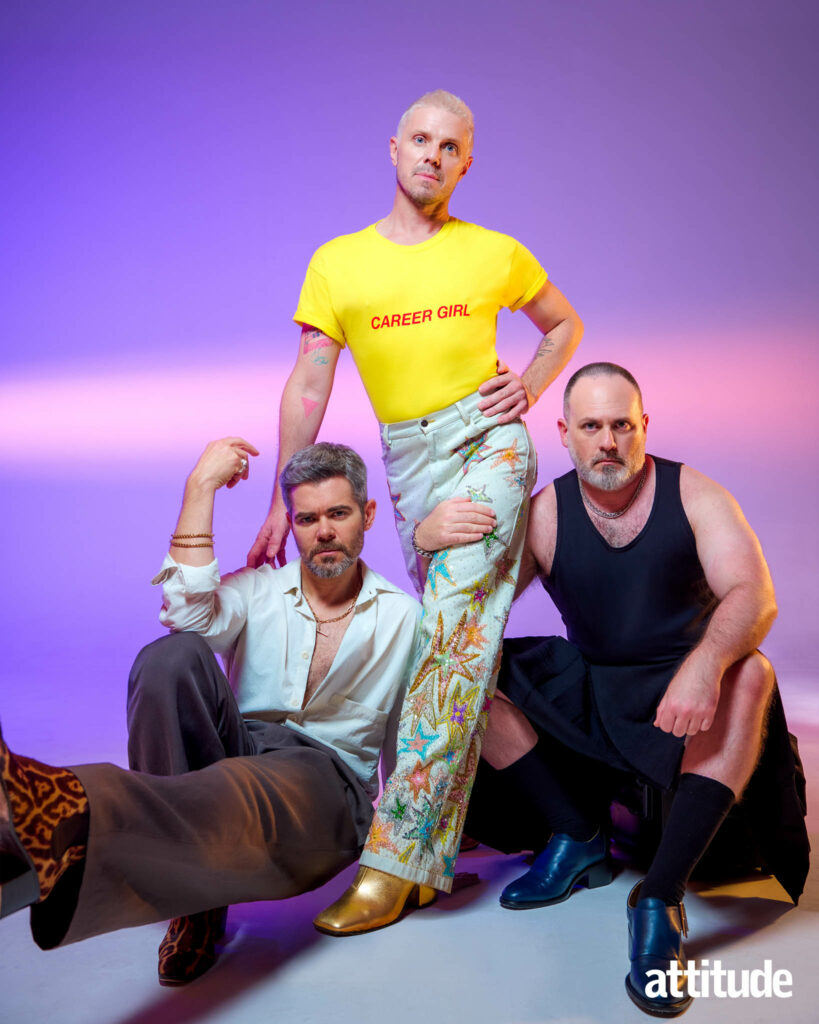
I have to ask about the elephant in the room – not that I’m calling her an elephant – but where’s Ana?
J: There are two elephants in the world right now today…
B: This was a process, putting this together and finding out when the timing was right. I really wanted the timing to be right for everyone. Ana was just focused on other stuff, and I think the timing wasn’t right. I didn’t know if it was going to be right to work in the context of the 20th anniversary before it became maybe another anniversary. So, we thought it was important to do something. And yeah, there were a lot of conversations about it. Like any creative people, we’re complicated, we’re nuanced, and usually when we’re focused on something, it’s kind of all-consuming. I know she’s just really consumed with the projects she’s working on right now. We were put in a bit of a conundrum because we really wanted to celebrate this. Especially in the UK, we feel like we are here because of this country, and that album is what really set the whole thing off. It was something we just really felt like we should do, even if it was in a slightly different line-up.
J: And we’re not getting any younger. You just have these moments where you’re looking at each other and being like, we can’t just…
D: Wait for another anniversary.
J: Yeah, you know, life is short. There comes a time where you have to live it. I think this was a great moment for us to do that.
Do you think the band’s dynamics will be different without Ana?
J: It’s going to be different. There’s no doubt about it. But I don’t necessarily think different is a bad thing.
B: We’ve gone through line-up changes before. We’ve rolled with the punches.
J: We performed without me once. I don’t even know where it was, but I got really sick, and the band went on without me one night. Me and Ana went on as a duo once, too.
B: Part of what we are is about changing things up. We’ve done it before. I think this situation is different because we’re looking at that era, we’re looking at that album, and we want to find fun ways to honour the album and remember it.
J: I think the show gives us an opportunity to make something fresh. It’s going to be different, and to me, that’s exciting.
I saw you all last week for our shoot, but since then Jake’s been to New York and back and was in a bicycle accident in London last week.
J: Maybe it’s a sign of me going too hard. I feel really worn down at the moment.
B: Jake’s the one of us who can have five obsessions at once. The rest of us are a little bit more single-minded, you know.
J: But it is going to be important for me to stop for a second, especially before doing this tour. I really want to get in stage shape again and just have a moment to take care of myself. I just closed on my house here, so I’m excited to get domestic with it and spend Christmas in it.
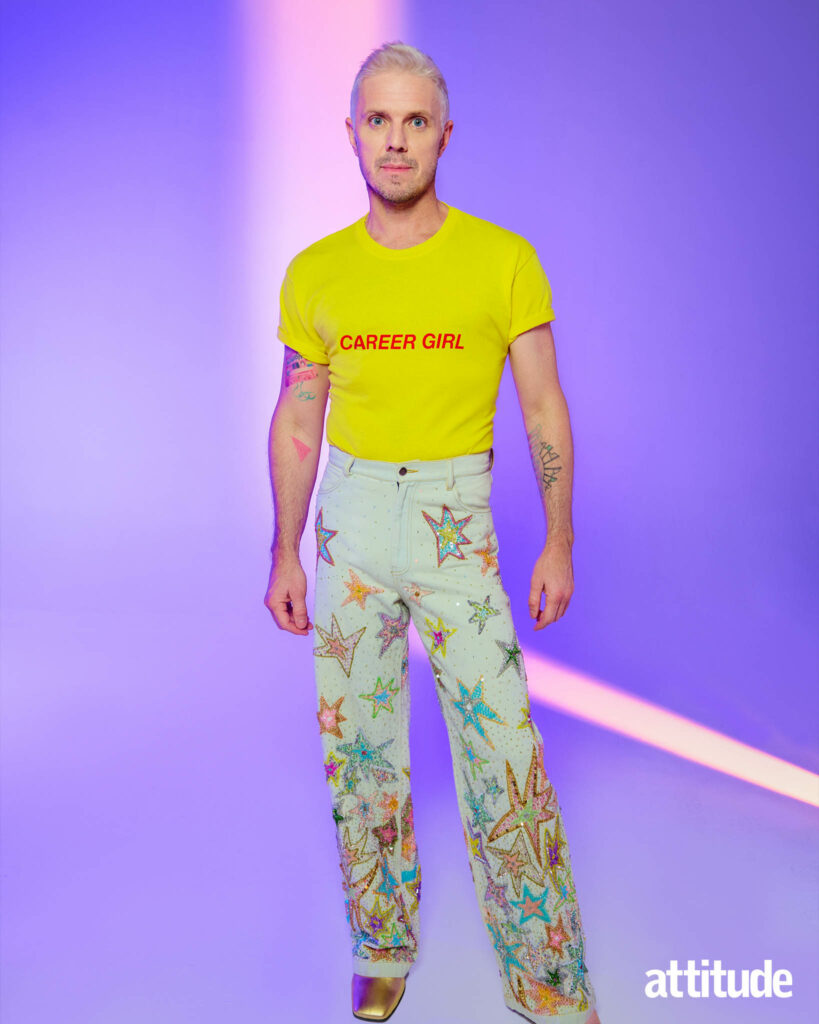
Congratulations on the house! What made you decide to move to the UK?
J: Well, I think today is a great example of why I’m really thankful that I just got a house here.
B: We could say, a changing landscape.
J: Yeah. I feel very unnerved about what’s going on back at home, and I just love it here. I never thought that I’d live here. Our friend Aimee Phillips, who we work with and is one of our dear friends, sort of convinced me to move here three years ago. It’s one of the best decisions I’ve ever made. I’ve just moved here but I haven’t stopped working since I got here. I love to work, and I love working on projects. It’s really kept me very busy. To me, that’s just a sign that this is where I need to be.
I still have my house in New Orleans, and that’ll always be my place to unwind. But I’ve jumped around so much in my life. The older you get, moving to a new spot is slower. It’s not that immediate plugging in. It takes longer to feel like you live someplace. But at 45, moving to London, it just feels different. I’m ready to settle down and plant deeper roots.
How does the political landscape now compare to when the band first started?
D: We had the Bush-Cheney presidency, and Americans were viewed in a very negative way all over the world.
B: Our first performance was a week after 9/11 in New York City.
D: We’re a product of maybe trying to provide some relief.
B: Maybe some commentary but mostly an escape, for our friends and for us, to calm ourselves and our audience.
D: Unfortunately, it’s a more familiar landscape than not. I think we’ve lived most of our lives in a kind of negative political and inhospitable landscape. Having gone through maybe some golden era presidencies and peace, it’s uncertain where we’re headed, but choices like this certainly seem to hasten whatever change might happen.
Was bringing some much-needed queer joy back to the world part of your decision to return?
J: I think being at our shows takes a little bit of pressure off your experience of the world around you.
B: And I think there’s a little bit of defiance in what we’ve always done—asking people to come out and just maybe be comfortable being who they are despite what they may feel outside of that.
J: A great example of this, and one of my favourite moments, is when we went to Russia. Right before our last year as a band, we played in Saint Petersburg and Moscow. It was really intense.
D: The regimes that exist now were bubbling up at that moment.
B: There’s always been the argument about whether you should go and play in countries where the government stands for the wrong things. We always said, we’re not playing for a government; we’re out there playing for people that may need a little bit of brightness.
J: Yeah. We got a lot of “Why would you go there?” But playing those shows, we realised how important it was. The people there desperately needed it and were risking something just being there. Those shows were really special to me.
B: It was scary.
J: It was. Pussy Riot had just been sentenced when we got there.
B: A Pride parade had been shut down.
D: We were warned not to say certain things.
J: I remember one of the bars I went to was firebombed and shut down shortly after. At one of the shows, we played four encores. The audience wouldn’t leave. We played every single song in our catalogue we were able to that night. Meeting people at those shows was eye-opening. I’m really proud we played there at that moment.
B: We’ve always tried to lean towards a sense of humour, even if it’s a bit of gallows humour about the situation we’re in. A lot of the people we loved in the New York scene came out of a tough era for gay culture—with AIDS, persecution, everything going on. I remember after 9/11, it felt like, “Should we perform? Is this the right time?” Then we said, “Is there a better time to perform, if we can bring a little levity to it?”
J: Our first performance was just the two of us, 10 days after the towers fell. The only reason we went out was to sing a stupid, funny song in front of a crowd and bring some cheer. That’s emblematic of what we’ve always done.
B: There’s always the question of whether it’s appropriate to entertain when times are bad. Jake was in Cabaret, which is a great example of showing a dark moment in a way that made the best of it. When things are dark, one of the most important things you can do is provide that kind of entertainment, even if some people think it’s fickle to sing pop songs during those times.
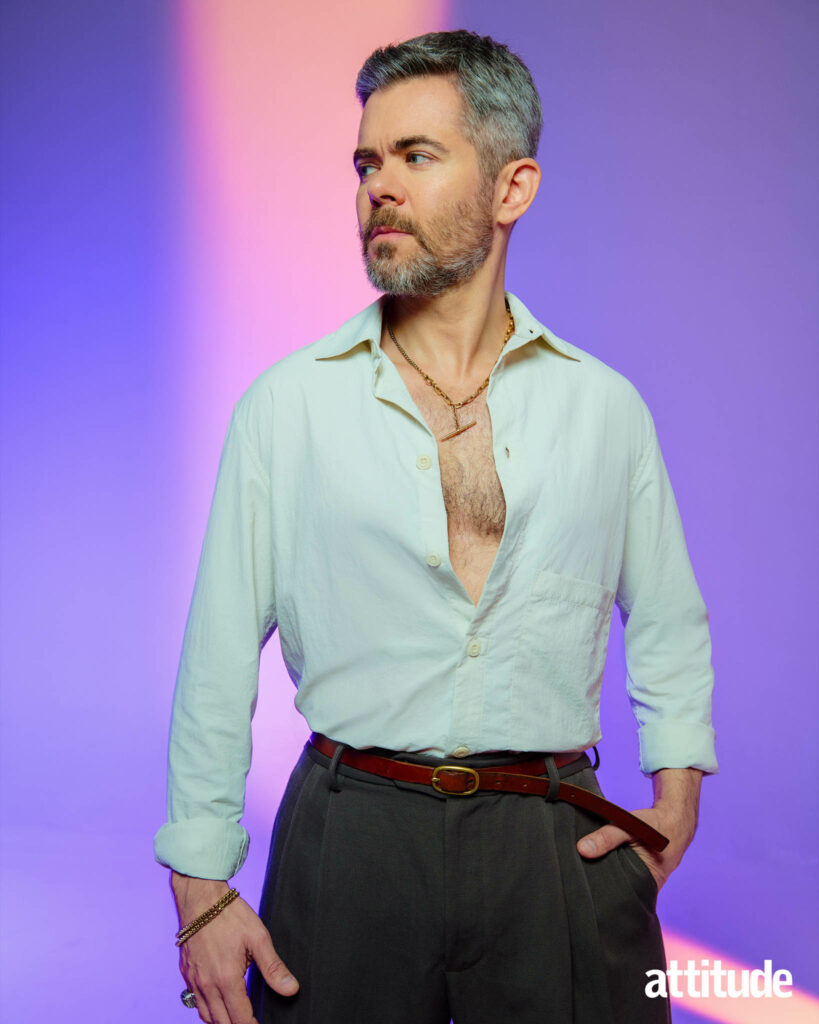
Have you started to formulate the show yet? And how are you choosing the music?
J: I’ve started writing it. I’ve written a couple of different versions of what the show could be.
D: We created an enormous Excel spreadsheet because there are a couple of Virgos in this band, and we colour-coded it—like “I definitely want to play this,” or “please, God, no.”
B: We went through and, like, the three of us basically marked the songs. Green was like, “we have to play this song,” and there were yellow ones.
D: And very easily, I realised, you know, I might put a big note against something, but then think, it’s not for me—that song is for someone else. I think there are accommodations we make for each other. Twenty years after being 25, it’s very different. I realise, “Yes, I’m here for me, I’m here for the guys, but I’m also here for the fans.” They want to hear certain things. But we also threw in a few things that are surprises and exciting for us—some oddities.
J: I told Del at one point, you know, maybe we should save this one or that one for another time. But then I said, “We need to play everything we want to play. Let’s pretend this is the last hurrah.” It could be the beginning of something, but it could also be the end. So, let’s play everything we want to play.
Do you have plans for new material?
J: Not for this tour. I just think we’ve got to do this, have fun, and see if there’s an appetite for it. But I’d really like to write another Scissors record.
What would a new Scissor Sisters album sound like?
J: I feel like we’ve got more songs in us. The last chapter of Scissors, with ‘Kiki’, was so unexpected. There are so many possibilities for us to surprise ourselves again. We’ve always mixed dance music with classic rock songwriting—and everything in between.
B: We’ve always had our own special brew. I’d be bummed if we stuck to one genre. I think we like genre as something to dip in and out of.
J: I’ve explored different avenues with my solo records, from southern rock to rave odysseys. I think Scissors can run the gamut too.
B: We’ve always tried to find something that challenges us. If we made another record, I think it would be impeccably produced—idiosyncratic and unmistakably ours.
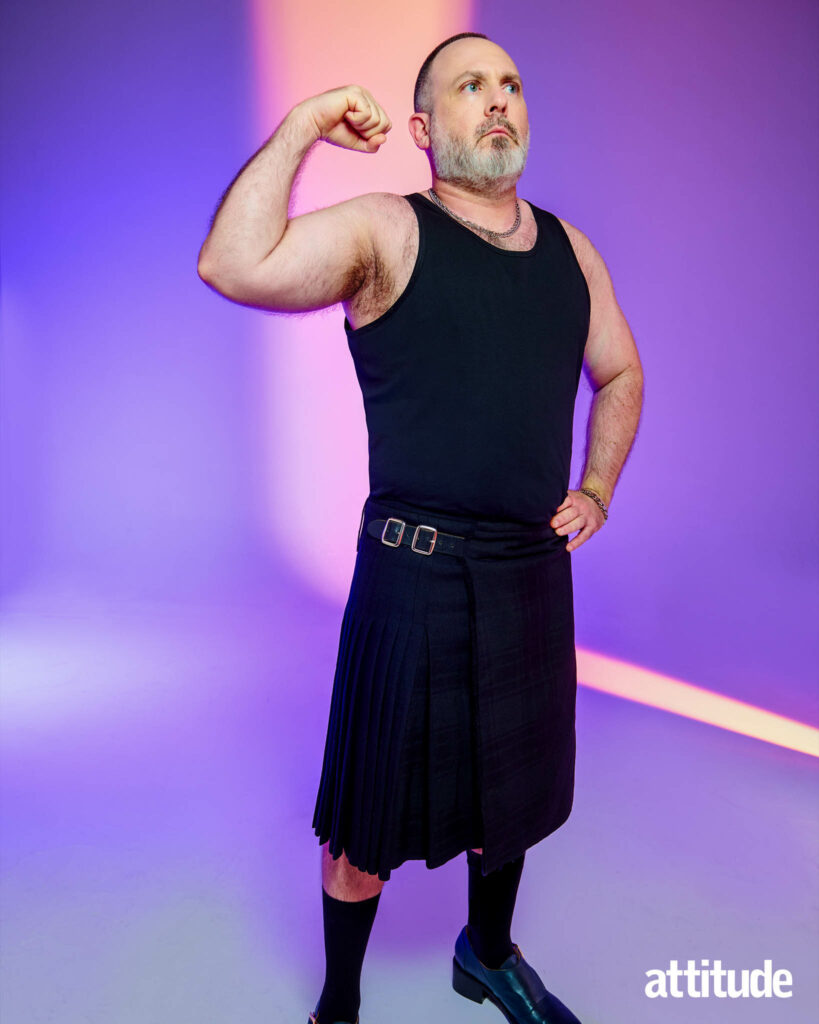
When you perform your most well-known songs on the tour, will you stay true to the originals, or change the production?
J: The only song I think is really hard to play off of that first album in its original form is ‘Filthy/Gorgeous’. I’ve found over the years, live-wise, it always needs some sort of a remix.
B: Yeah, it was always a strange collection of loops and samples. It’s a funny one.
J: I’ve been playing it mashed up with Frankie Goes to Hollywood’s ‘Relax’ for the last few years. It still feels like the same song but has a bit of a remix vibe live.
Will you have guests performing with you?
J: Yeah, if they’ll show up! I mean, we’ve always kind of been a bit of a circus. We started out in New York with friends, always having people on stage, always having surprises, always having guests. There’s always been an element of the variety show with our band.
B: We’re still trying to figure out how that’s going to work.
J: There’s definitely plenty of people we’d love to have.
B: We’ve got a long wish list.
Is Elton John on that list?
B: He’d be great. I mean, who wouldn’t want Elton on stage?
What’s the story behind Elton John and his connection to Scissor Sisters?
J: It goes back to Attitude magazine! We did a performance for Attitude’s 10th birthday in 2004 and Elton came with George Michael, Emma Bunton, and Lulu. The four of them came together and they all came backstage afterwards and were so sweet.
Elton then took us on tour. We became really close with him and became good friends. He looked after us in a very sweet way. We had so many experiences with him, started writing together, and ended up releasing ‘I Don’t Feel Like Dancin’’. That was the biggest song of the year here. We won an Ivor Novello with him and just became great friends. He and David are forever family.
Years later, now we’ve got a show opening on Broadway together [Tammy Faye, with music by Elton John and lyrics by Jake Sheares]. We’ve had this incredible 20 years of friendship and creative collaboration. He’s one of the loves of my life.
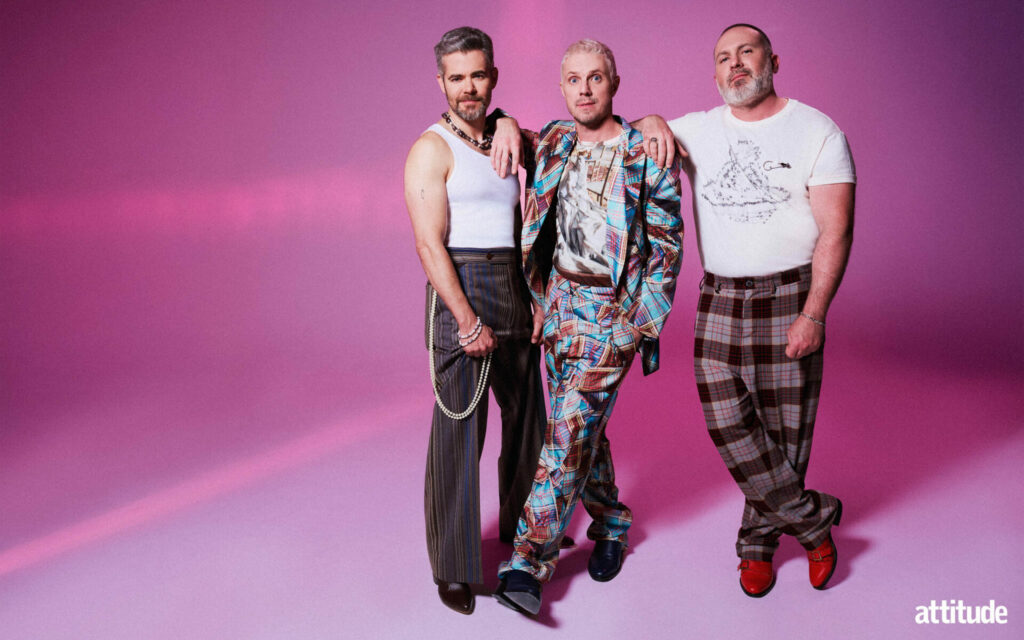
How did he get involved with the Tammy Faye musical?
J: We’d always talked about a Christian broadcasting musical or something. Twelve years ago, at his birthday, I was sitting next to him at Craig’s in LA, and he turned to me and said, “I’ve got Tammy Faye’s life rights to make a musical. Do you want to do it with me?” I was over the moon. Of course, I said yes. That’s how it started.
The core of Tammy Faye is the birth of the contemporary Republican Party, the moral majority, and how religion insinuated itself into politics—how Reagan got elected. It’s interesting to be working on a project that’s so directly related.
You’ve said in early interviews you were always referred to as “the gay band.” How do you think the music scene has shifted since?
J: I think people are just more used to it now. When we first came out, the media was fascinated by our queerness and the fact that we were out. At moments, it seemed like that’s all people wanted to talk about.
D: It was a novelty and a focus in interviews to the point where we kind of had to address it. At that point, we were in our mid-20s, but we’d been mostly out for a decade already, so it wasn’t new to us. But in the landscape of pop and rock, I guess our concept was still quite novel. There were gay bands and duos that came before us, but it was almost linear—like every 10 years, there’d be someone. Only now does it feel like there’s a large landscape, a sea of queer performers. Back then, we were still an oddity in that respect.
Do you think you paved the way for out, queer performers today?
D: I think we’re all standing on the shoulders of those who came before us. I hope we’ve influenced bands that are out now. Maybe some were teens who saw us being unapologetically ourselves, very comfortable with our sexuality.
J: At that time, that wasn’t the norm. I remember getting frustrated with lines of questioning and that fascination with our queerness. I’d get a chip on my shoulder about it, but I also remember thinking, even though it’s annoying now, it’s going to make it easier for others after us. That thought crossed my mind many times, and I hope it did help.
What do you all fill your days with when you’re not being pop stars?
D: I’m a homebody. I garden, I build, I tinker—I’m always using my hands. Landscaping, working in design—I’ve lived a very norm-core existence. It’s been nourishing, but a journey. Leaving a pop band and moving into that kind of life was a big shift. I think of those Where Are They Now? pieces, where you’d read someone became a graphic designer and think, “Why would you do that?” But you don’t realise there are elements to life that are bigger and more important than being famous or being on stage.
Coming back to this now, I feel like maybe I can have both. I can have my life, and I can get back on stage. That’s the motivation for me—having had enough of my life, I’m ready to come back and see if both things can exist at the same time.
As a designer, will you be involved in any of the set design for the show?
D: This body is a set—I’ll be building it over the next four months! But, yeah. This is a collaborative situation. We’re all excited to think about every creative aspect. There isn’t a mind here that isn’t energised by creative direction, performance, and the possibilities—from top to bottom. We’re a band about details but also about leaving room for chaos or happy accidents.
Fellow gaymer here! What kind of video games do you play?
B: Jake and I were just talking about this. I like pretty brutal adventure games. I don’t know if you play the Dark Souls games, but I’m into that kind of challenge. The Last of Us is another one we both love. And we like Nintendo as well. I’ll play a good Mario game. I played the new Zelda, which was great.
J: I’m playing Astro Bot on PS5 right now and loving it. We both love survival horror too.
B: The Last of Us is brilliant, but we also keep going back to Resident Evil.
J: The new Dead Space last year was terrifying.
B: Oh my God, brutal.
How else do you fill your days, Babydaddy?
B: I like to read a lot—books, novels, and comics. I’ve spent the last few years writing. I want to write a novel, which is in the works, but I also have my third graphic novel coming out, or a limited series comic book called Warm Fusion. It’s coming out next month. It’s sci-fi horror, kind of heady stuff. That’s really my passion.
J: It’s amazing. It’s been incredible watching him grow in that way—I’m really proud of him.
B: It’s been challenging but fun. I hung up music for a while after we took our break and was writing and producing for others. Then I decided to dive into something I’ve always wanted to do. We were both in writing school when we started the band, but this was something I had to learn from scratch—how to write for this format. I love world-building and creating fantasies. In some ways, it’s not too different from Scissors—creating a little world people can escape into.
J: My passions have grown a lot in the last five years. Film has been a big one—I’ve become such a cinephile. It’s not something I’m interested in doing professionally, but I’m constantly reading and watching film books. Video games are another big thing for me. I love theatre, DJing, dance music. But the thing I haven’t been doing much this past year is songwriting. I think I’ve written maybe two songs for other people, but I miss it. I’m definitely thinking about when I’ll start writing songs again
Can you still hit your famous high notes, Jake?
J: I think so, yeah. Although I accidentally crushed my larynx a couple of years ago. I was doing a fight scene for something I was filming. We really should have had a fight coach on set, but we didn’t, and I ended up really hurting myself. It was the cartilage, and it’s basically gone now. I can still feel it a little, though. It was scary for a while—there was a moment where I thought, “Did I just completely ruin this part of my career?” It was a pretty serious injury, but I’ve managed to get it back. I can still go pretty high!
Finally, and most importantly, will your skimpy stage wardrobe be making a comeback?
Jake: (Laughs) Well, we’re all over 45 at this point but I think we’ll be in great shape…
Babydaddy: You’ll end up showing a little skin!
Jake: I hope so!
The Scissor Sisters’ UK and Ireland arena tour kicks off in May 2025. Tickets are on sale now at scissorsisters.com.
This interview is taken from issue 362 of Attitude, available to pre-order now.
Words: @daleljfox
Photography: @spam__jam
Lighting tech: @scotthobsonjones
Styling: @florahuddart
Makeup: @gracexhayward using @iconic.london
Hair: @svenbayerbach at @carolhayesmanagement using @thedrybar
